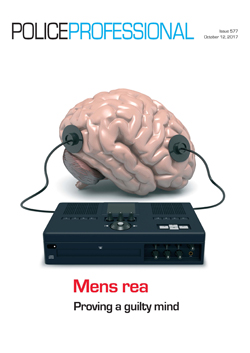View the latest edition online
In this weeks edition, we have news of the Home Office launching a new hate crime hub run by a small team of police officers to assess complaints and delegate them to the appropriate force and Jeremy Fleming, head of GCHQ says keeping the UK safe from cybercrime is as important as the fight against terror. There is lots more news and features including a look into the new HMICFRS inspection regime, a new wave of secure and anonymous virtual currencies is leading to a loss of investigative leads in dark web cases, we explore how brainwave patterns can indicate guilt, new research suggests higher temperatures can increase violent crime and disorder, and we talk to Cellebrite about how it is manages digital intelligence from forces across the UK. We also explore policings forensic digital capability in the third Research Inspector feature and Ian Blackhurst explains why the impact of technology on people should be considered when installing new IT.
In this weeks edition, we have news of the Home Office launching a new hate crime hub run by a small team of police officers to assess complaints and delegate them to the appropriate force and Jeremy Fleming, head of GCHQ says keeping the UK safe from cybercrime is as important as the fight against terror. There is lots more news and features including: Looking to the future All forces will soon be expected to take a forward-looking view of their performance as a new inspection regime is introduced, reducing the level of scrutiny on one hand but requiring a cultural shift to measuring capability on the other. In the dark Driven by the need for anonymity among dealers, new currencies are emerging within hidden areas of the internet, raising the question of whether law enforcement has the skills and powers to reach where criminals are now operating. Mens rea The brain can provide tell-tale signs of guilt, even though an admission in interview is elusive. Experts on brain fingerprinting put forward their views on its use in policing. Climate control Officers have long suspected that weather conditions can affect local crime rates, but new research has explained exactly how much of an impact it can have. Managing digital evidence In this article, the third in a regular feature, the Research Inspector looks at a new study exploring policings forensic digital capability. Extracting intelligence Law enforcement agencies face a growing challenge of managing the explosion of digital evidence, yet as we all increasingly use smart technology and digital services in our everyday lives, the benefits to police are significant. Police Professional talks to one company that is helping UK forces make sense of all the data. The will of the people Ian Blackhurst examines why the success of any technology transformation lies with some very human elements. Criminal Law Week Round-up of new developments regarding offences, police powers and the rules of procedure and evidence. To view the edition click here


